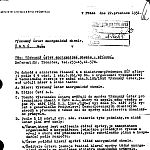History of refinery-petrochemical research in Chempark Záluží
The research in Litvínov was motivated by the post-war situation when it was necessary to produce fuels for Czechoslovakia without any other sources. The raw material was coal but soon it was necessary to switch to a binary raw material base, i.e. coal and oil. The factory was damaged, German experts were relegated. In the 1950s, an embargo was imposed on imports of Western catalysts and advanced technologies.
Luckily, a group of enthusiastic young engineers gathered here to take on the difficult task.
It was necessary to build both development and operational laboratories. In 1952, these were profiled by the Research Institute for Chemical Utilization of Coal (VÚCHVU), which had up to 300 employees at the time of its biggest boom. From 1962, it operated as the Research Institute for the Chemical Utilization of Hydrocarbons.
The profile of this institute mirrored the development of the factory, which until 1972 focused on the chemical co-processing of coal and oil. Since the 1970s the company developed significantly, which consisted in a capacity increase in production. It developed in terms of quantity (Druzhba pipeline) and qualitatively (deep oil processing, petrochemistry and polymer production). However, the research of polymer production was carried out by VÚMCH (Research Institute of Macromolecular Chemistry, nowadays Polymer Institute Brno).
The research was motivated by the need for co-processing of both raw materials. Since 1972, when the chemical processing of coal was stopped, only oil processes have been developed. VÚCHVU continued to focus on its own heterogeneously catalyzed processes. Due the fact the company has its own research the production of motor fuels and polymers corresponded to the European level.
During the political changes in 1990s, which significantly affected the organization of the Czech chemical industry, VÚCHVU was renamed to the Research and Development Center (VVC). Research continued here according to the needs of the Chemopetrol company, especially in the field of catalytic processes. However, it competed with other research departments of the later owners of the refinery - Shell, Agip and Conoco. The fact that the research has survived this period proves its European level. During other organizational changes, the VVC section was connected with the independent joint stock company Institute of Inorganic Chemistry (VÚAnCh).














